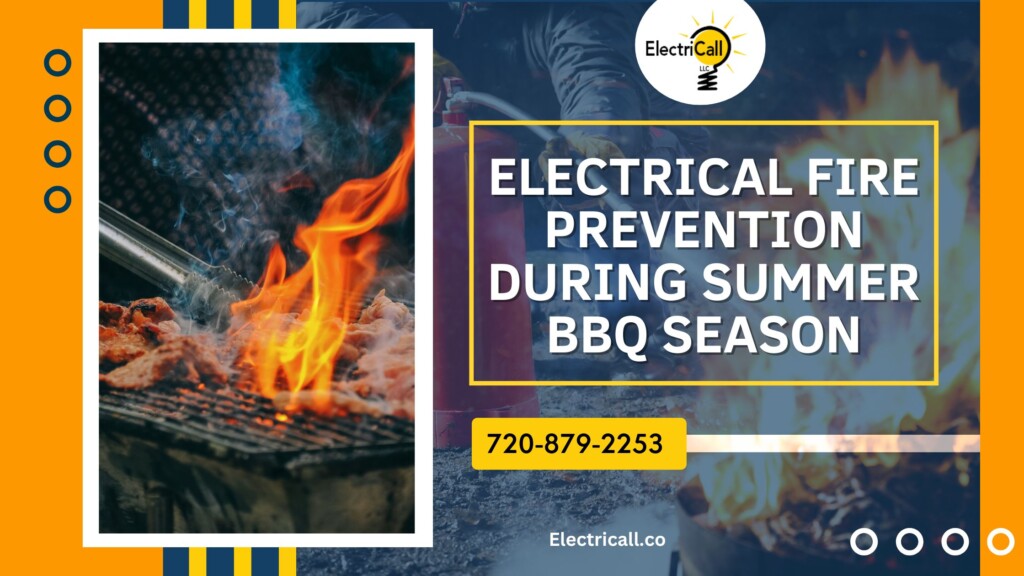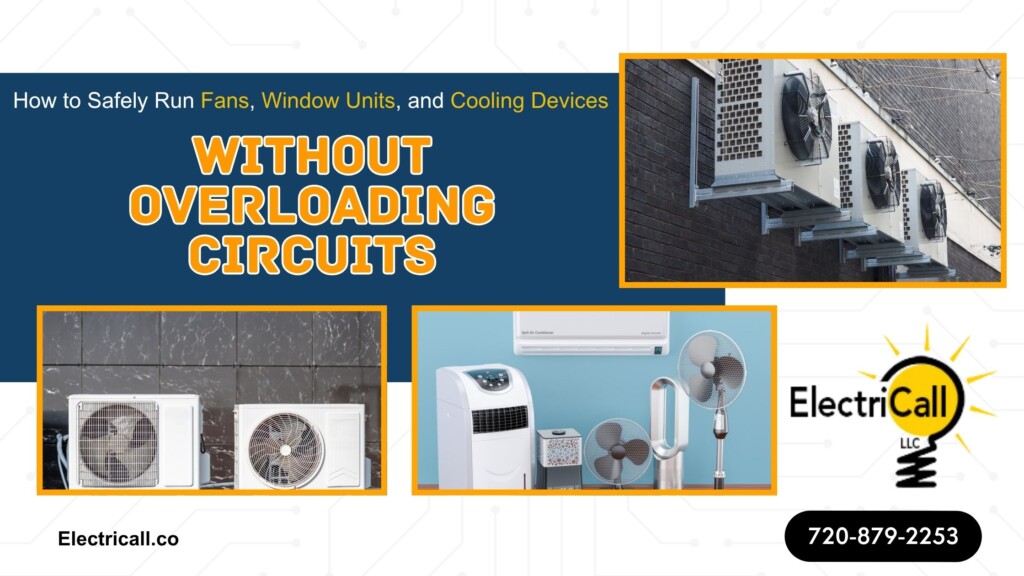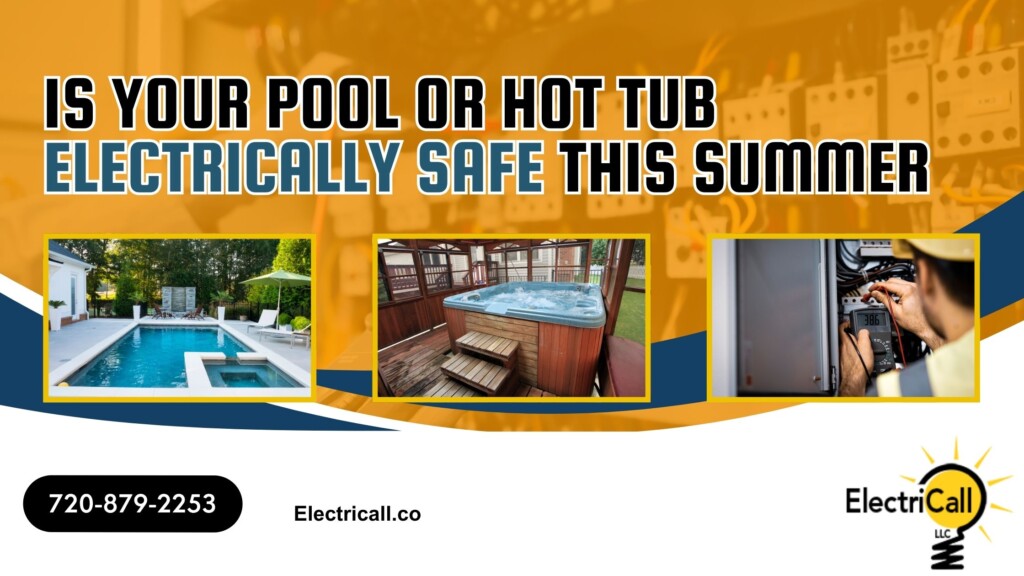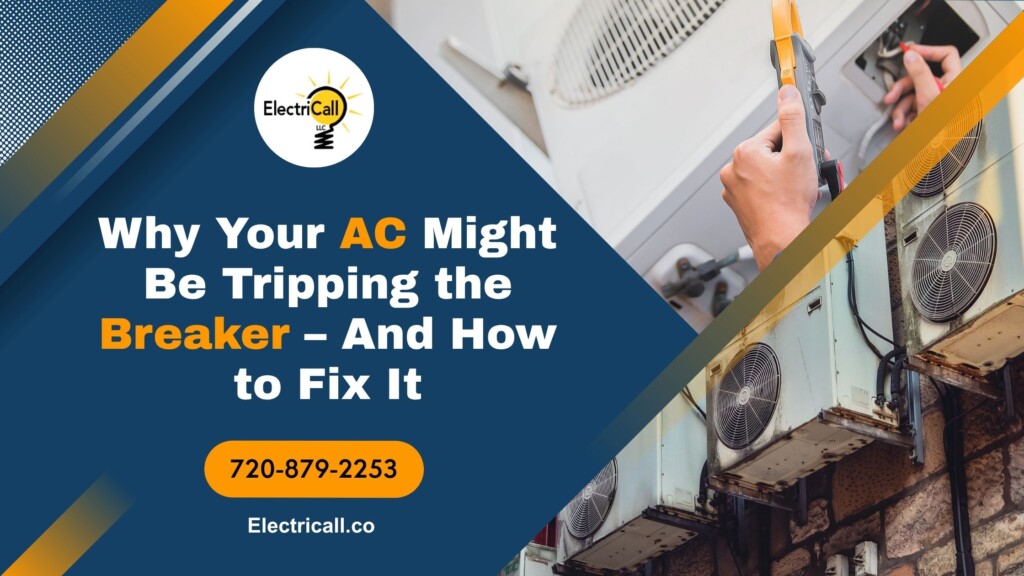
Summer BBQ season brings families together in backyards across the Denver Metro area. Your outdoor gatherings create lasting memories, but they also introduce serious electrical fire risks that many homeowners overlook.
Colorado’s dry summer conditions make electrical fire prevention crucial. A single spark from faulty wiring or an overloaded extension cord can ignite devastating fires that spread rapidly through our arid landscape.
Hidden Electrical Dangers During Summer BBQs
Most electrical fires during outdoor events start with seemingly harmless decisions. You plug your sound system into an indoor extension cord. You connect multiple devices to a single outdoor outlet. You string temporary lighting without checking wire conditions.
The National Fire Protection Association(NFPA) reports that electrical failures cause 13% of home structure fires annually. During summer months, this percentage increases significantly as homeowners push their electrical systems beyond safe limits.
Your backyard electrical setup faces unique challenges during BBQ season:
- Temperature fluctuations stress wire connections
- Moisture from sprinklers and humidity affects electrical components
- Heavy usage patterns overload circuits designed for lighter loads
- Temporary installations bypass proper safety protocols
Common Electrical Hazards at Backyard Gatherings
Overused Extension Cords Creating Fire Risk
Extension cords become fire hazards when you exceed their rated capacity. A typical 16-gauge extension cord safely handles 13 amps. Your outdoor refrigerator, sound system, and lighting combined often exceed this limit.
Heat buildup occurs when cords carry excessive current. This heat degrades wire insulation and creates fire conditions. Many homeowners daisy-chain multiple extension cords, compounding the danger.
Overloaded Outdoor Outlets
Your standard outdoor outlet connects to a 15-amp or 20-amp circuit. Summer BBQ equipment quickly overwhelms these circuits:
- Outdoor refrigerator: 6-8 amps
- Sound system with amplifier: 4-6 amps
- String lighting: 2-4 amps
- Electric grill accessories: 8-12 amps
This combination trips breakers at best. At worst, it creates fire conditions before protective devices activate.
Improperly Installed Outdoor Lighting Systems
Temporary lighting installations often use indoor-rated components exposed to weather. Moisture infiltration causes short circuits and electrical arcing. String lights with damaged insulation create direct fire hazards.
Many homeowners connect lighting systems without proper junction boxes or weatherproof connections. These installations violate electrical codes and create fire risks.
Faulty Wiring for Grills and Outdoor Appliances
Outdoor appliances require dedicated circuits with proper amperage ratings. Electric grills, outdoor refrigerators, and sound systems need stable power delivery. Inadequate wiring causes voltage drops, equipment damage, and fire hazards.
Aluminum wiring, common in older Denver Metro homes, poses additional risks outdoors. Aluminum connections loosen over time, creating high-resistance points that generate dangerous heat.
Colorado-Specific Electrical Fire Concerns
Denver’s elevation and climate create unique electrical challenges. Our dry summer air reduces humidity that normally provides some electrical insulation. Static electricity builds more readily, increasing shock and fire risks.
Colorado’s wildfire season overlaps directly with BBQ season. An electrical fire that might remain contained in humid climates can spread rapidly through our dry vegetation. Jefferson County and surrounding areas have experienced devastating wildfires started by electrical equipment failures.
Local electrical codes in Arvada and throughout the Denver Metro area require GFCI protection for all outdoor outlets. These requirements exist because our environmental conditions amplify electrical hazards.
Essential Electrical Safety Tips for Summer Events
Use Only Outdoor-Rated Equipment
Outdoor electrical equipment carries weatherproof ratings. Look for these markings:
- “W” rating for wet locations
- NEMA enclosure ratings 3R or higher
- UL listing for outdoor use
Indoor extension cords lack weatherproof construction. Water infiltration through damaged insulation creates electrocution and fire hazards.
Install GFCI Protection for All Outdoor Circuits
Ground Fault Circuit Interrupter (GFCI) devices prevent electrocution by detecting current leakage. Every outdoor outlet requires GFCI protection per National Electrical Code requirements.
GFCI outlets shut off power within milliseconds when they detect dangerous conditions. This protection prevents many electrical fires before they start.
Inspect All Electrical Equipment Before Use
Check extension cords for these warning signs:
- Cracked or brittle insulation
- Exposed wire conductors
- Bent or damaged plugs
- Scorch marks or burn odors
- Loose connections
Replace damaged equipment immediately. Electrical tape cannot safely repair compromised insulation.
Avoid Daisy-Chaining Power Strips
Connecting multiple power strips creates fire hazards. Each connection point introduces resistance that generates heat. Power strips designed for indoor use lack weatherproof construction needed for outdoor environments.
Calculate your total electrical load before connecting equipment. Ensure your circuit capacity exceeds your planned usage by at least 20%.
Professional Electrical Solutions for Outdoor Entertaining
Dedicated Outdoor Circuit Installation
Professional electricians install dedicated circuits sized for your specific outdoor needs. A 20-amp circuit safely powers most BBQ setups. Larger installations may require 30-amp or 50-amp circuits.
Dedicated circuits eliminate overloading risks and provide stable power for your equipment. Proper installation includes weatherproof panels and GFCI protection at the source.
Proper GFCI Protection Setup
GFCI protection comes in multiple forms:
- GFCI outlets at each location
- GFCI breakers protecting entire circuits
- Portable GFCI devices for temporary use
Professional installation ensures proper GFCI operation and code compliance. DIY GFCI installations often fail due to incorrect wiring connections.
Permanent Outdoor Kitchen Wiring
Outdoor kitchens require complex electrical systems. Multiple circuits serve different equipment types:
- 240-volt circuits for electric grills
- 120-volt circuits for refrigeration
- Low-voltage circuits for lighting systems
- Control circuits for automated systems
Licensed electricians design these systems to meet current electrical codes and future expansion needs.
Surge Protection for Outdoor Equipment
Outdoor electrical equipment faces voltage fluctuations from weather and grid conditions. Whole-home surge protection shields your investment in outdoor appliances.
Point-of-use surge protectors provide additional protection for sensitive electronic equipment like sound systems and automated controls.
When to Call ElectriCall for Immediate Service
Contact our emergency electrical services immediately if you notice:
- Burning smells from outlets or electrical equipment
- Sparking or arcing from connections
- Frequent circuit breaker trips
- Warm or hot electrical panels
- Flickering lights when appliances start
These symptoms indicate dangerous electrical conditions requiring immediate professional attention.
Call ElectriCall now at 720-879-2253 for emergency electrical service.
Professional Electrical Safety Inspections
Schedule electrical safety inspections before BBQ season begins. Our certified electricians identify potential hazards and recommend safety improvements.
Inspection services include:
- Outdoor outlet testing and GFCI verification
- Circuit capacity analysis for planned loads
- Extension cord and equipment safety evaluation
- Code compliance verification for existing installations
Arvada’s Outdoor Electrical Requirements
Arvada sits in the heart of Jefferson County, where electrical codes reflect our unique environmental challenges. The city’s elevation of 5,344 feet and proximity to the Rocky Mountain foothills create electrical conditions different from sea-level locations.
Historic Olde Town Arvada hosts numerous outdoor events throughout summer. The area’s Victorian-era homes often require electrical upgrades to safely support modern outdoor entertaining needs.
The Clear Creek running through Arvada creates microclimates that affect electrical equipment. Moisture from the creek combined with our dry climate creates condensation cycles that stress electrical connections.
Local landmarks like the Arvada Center for the Arts and Humanities demonstrate proper outdoor electrical installations. These facilities show how professional electrical design creates safe outdoor entertainment spaces.
Take Action Today
Your family’s safety depends on proper electrical preparation for summer BBQ season. Don’t risk electrical fires that could destroy your home and threaten lives.
Contact ElectriCall today for professional electrical safety services:
- Emergency repairs: Available 24/7 for urgent electrical hazards
- Safety inspections: Comprehensive electrical system evaluation
- Outdoor circuit installation: Dedicated power for your BBQ area
- GFCI upgrades: Code-compliant safety protection
Call 720-879-2253 now to schedule your electrical safety consultation. Our experienced electricians serve Arvada, Jefferson County, and the entire Denver Metro area with reliable electrical solutions.
Summer BBQ season should create great memories, not electrical emergencies. Let ElectriCall ensure your outdoor electrical systems operate safely and reliably all season long.



